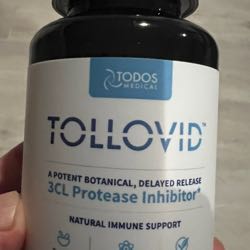Press Releases Elto Pharma Receives Notice of A
Post# of 30081

Elto Pharma Receives Notice of Allowance in Australia for Patent Covering Eltoprazine in the Treatment of Parkinson's Levodopa-induced Dyskinesia
Download as PDF
MARCH 08, 2018
SAN FRANCISCO, March 08, 2018 (GLOBE NEWSWIRE) -- via OTC PR WIRE--Elto Pharma, Inc., a specialty pharmaceutical, clinical-stage wholly-owned subsidiary of Amarantus Bioscience Holdings, Inc. (OTCPK:AMBS), advancing Eltoprazine into a Phase 2b trial for the treatment of the orphan indication Parkinson's disease levodopa-induced dyskinesia (PD-LID), today announced that it has received a notice of allowance from the Australian Patent Office for a patent application entitled "Treatment of Motor and Movement Disorder Side Effects Associated With Parkinson's Disease Treatments" which protects use of Eltoprazine for the treatment of PD-LID, including the use of Eltoprazine in combination with other relevant Parkinson's therapeutics. Upon issuance, the allowed patent will extend exclusivity for the use of Eltoprazine in Australia for the treatment of PD-LID into 2032. Eltoprazine received orphan drug designation from the US FDA for PD-LID in February 2016.
An IND for Eltoprazine was opened with the neurology division of the US FDA in May 2015 that allowed the Company to initiate a multi-center, randomized, placebo-controlled crossover design Phase 2b trial of Eltoprazine in the treatment of PD-LID in the United States and Europe that was put on recruitment hold in September 2015. The European portion of the trial was closed in 2016. The Company is currently preparing to redesign its Phase 2b PD-LID trial into a Phase 3-enabling parallel design clinical trial as a result of the recent approval of Gocovri from Adamas Pharmaceuticals for the treatment of PD-LID. Elto Pharma is in the process of recruiting seasoned management to lead Elto Pharma going forward.
Clinical data for Eltoprazine in PD-LID
The Eltoprazine study in 22 subjects with long standing PD-LID was a randomized, four-way crossover design in which patients received a single dose of placebo and eltoprazine, at 2.5, 5 and 7.5 mg, in combination with a challenge dose of levodopa (1.5 times usual dose), on four different days, separated by an interval of a week. Data from the study demonstrated that eltoprazine significantly reduced peak dose dyskinesia at both the 5 (p<0.05) and 7.5 mg (p<0.05) doses using the Combined Dyskinesia Rating Scale. The 5 mg dose also showed a significant anti-dyskinetic effect on other measures of dyskinesia, including the Rush dyskinesia rating scale. Importantly, there were no adverse effects on levodopa efficacy at any dose level as evidenced by United Parkinson's Disease Rating Scale (UPDRS Part III) observation. Additionally, all dose levels of eltoprazine were well tolerated with no major adverse effects reported. A link to the publication of the PD LID clinical data is provided here: https://academic.oup.com/brain/article/138/4/...yskinesias
Press release of Phase 2 trial data in Agitation in Dementia (Alzheimer's disease): https://www.amarantus.com/news/press-releases...ltoprazine
Press release of Phase 2 trial data in Adult ADHD: http://www.amarantus.com/news/press-releases/...ltoprazine
About Elto Pharma, Inc.
Elto Pharma, Inc. is developing Eltoprazine, an oral small molecule 5HT1A/1B partial agonist in clinical development for the treatment of Parkinson's disease levodopa-induced dyskinesia (PD-LID), Alzheimer's aggression and adult attention deficit hyperactivity disorder (adult ADHD). Eltoprazine has been evaluated in over 680 human subjects to date, and has a well-established safety profile, with statistically significant efficacy results across multiple central nervous system indications. Eltoprazine has received orphan drug designation (ODD) from the US FDA for the treatment of PD-LID.
Eltoprazine was originally developed by Solvay (now Abbvie) in aggression-related indications. The eltoprazine program was out-licensed to PsychoGenics, Inc. (PGI). PGI licensed eltoprazine to Amarantus in 2014 after a successful proof-of-concept trial in PD-LID.
In April 2017, Amarantus incorporated the wholly-owned subsidiary Elto Pharma, Inc. for the purpose of raising capital to finance the further clinical development of Eltoprazine.
About Amarantus Bioscience Holdings, Inc.
Amarantus Bioscience Holdings (AMBS) is a biotechnology company developing treatments and diagnostics for diseases in the areas of neurology, regenerative medicine and orphan diseases through its subsidiaries. AMBS' wholly-owned subsidiary Elto Pharma, Inc. has development rights to eltoprazine, a Phase 2b-ready small molecule indicated for Parkinson's disease levodopa-induced dyskinesia, Alzheimer's aggression and adult attention deficit hyperactivity disorder, commonly known as ADHD. AMBS acquired the rights to the Engineered Skin Substitute program (ESS), a regenerative medicine-based approach for treating severe burns with full-thickness autologous skin grown in tissue culture that is being pursued by AMBS' wholly-owned subsidiary Cutanogen Corporation. AMBS' wholly-owned subsidiary MANF Therapeutics, Inc. owns key intellectual property rights and licenses from a number of prominent universities related to the development of the therapeutic protein known as mesencephalic astrocyte-derived neurotrophic factor ("MANF"
For further information please visit www.Amarantus.com, or connect with the Amarantus on Facebook, LinkedIn, Twitter and Google+.
Forward-Looking Statements
Certain statements, other than purely historical information, including estimates, projections, statements relating to our business plans, objectives, and expected operating results, and the assumptions upon which those statements are based, are forward-looking statements. These forward-looking statements generally are identified by the words "believes," "project," "expects," "anticipates," "estimates," "intends," "strategy," "plan," "may," "will," "would," "will be," "will continue," "will likely result," and similar expressions. Forward-looking statements are based on current expectations and assumptions that are subject to risks and uncertainties which may cause actual results to differ materially from the forward-looking statements. Our ability to predict results or the actual effect of future plans or strategies is inherently uncertain. Factors which could have a material adverse effect on our operations and future prospects on a consolidated basis includes but are not limited to: changes in economic conditions, legislative/regulatory changes, availability of capital, interest rates, competition, and generally accepted accounting principles. These risks and uncertainties should also be considered in evaluating forward-looking statements and undue reliance should not be placed on such statements.
Amarantus Investor and Media Contact:
Ascendant Partners, LLC
Richard Galterio
+1-732-410-9810
 (2)
(2) (0)
(0)